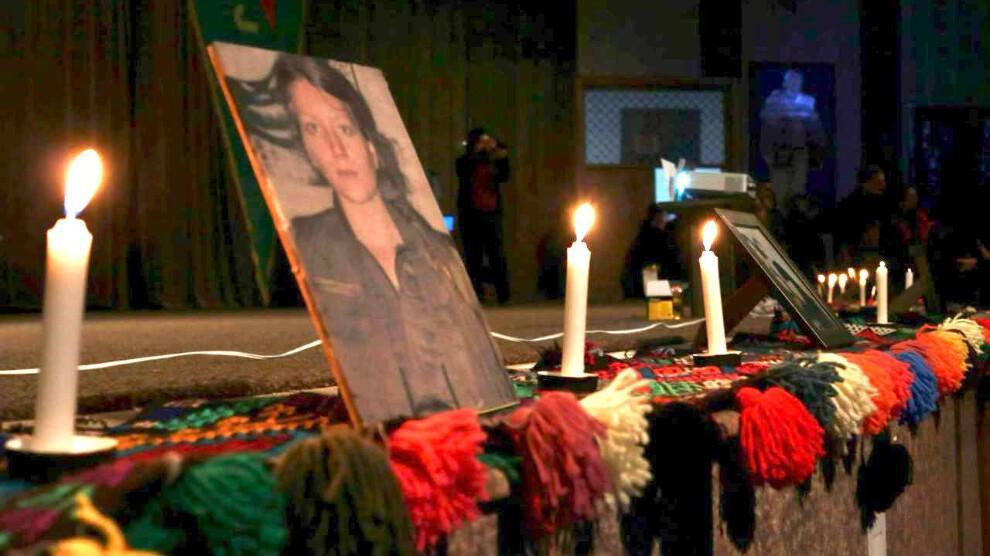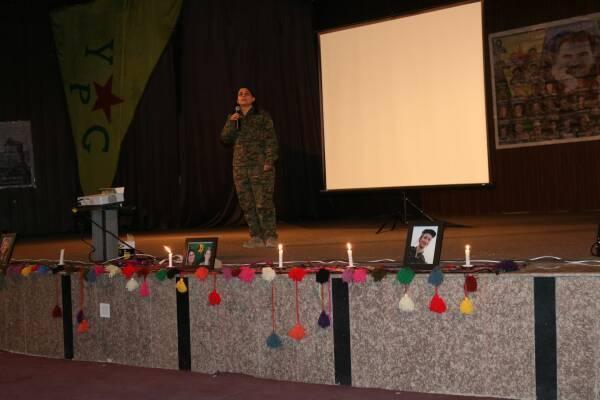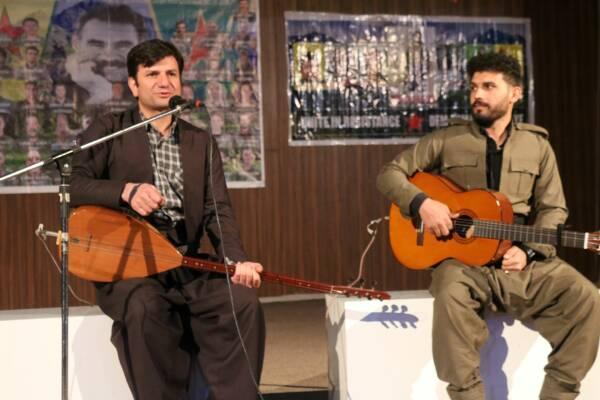
“Long live equality of peoples, long live peace!” It was Elefteria Fortulaki who wrote these words in her last letter. On March 24, 2006, she set herself on fire in the Greek capital, Athens, in protest against the imprisonment of Abdullah Öcalan. She died as a martyr a day later. To remember them and all other internationalist martyrs, over 100 people came together on March 23 morning for a memorial event. This day is a symbol of the international martyrs and is part of the so-called “heftiya lehengiye”. It’s the week of the 21st-28th of March, which is specifically dedicated to the martyrs of the revolution. Şehîd (Martyr) Elefteria, whose name is a historical symbol of the defense of truth and peace, was the mother of two children. A 23-year-old Greek mother who was bonded with the struggling people of Kurdistan and became an example of militant internationalism through her actions. In her youth, she learned about politics through the communist party in Greece. Later, she and her Kurdish husband named their children ‘Ernesto’ and ‘Clara’. Şehîd Elefteria understood the conspiracy as an attack against all freedom-loving people. With her action, she deepened and expressed her connection with the Kurdish people, with all peoples.
A decade later, Şehîd Elefteria Hambi took her name to follow in the footsteps of this vanguard. Both women are symbols and examples and belong to the history of internationalists who, even far from their homeland, dedicated themselves to revolution and the fight for humanity.
In the opening speech, the moderators emphasized the importance of the internationalist martyrs and the thread that connects all of them throughout years and centuries. With their sacrifice, they show the world how to overcome the borders of the states and in the minds of people. They brought the revolution to a global level. And through the link between Haki Karer and Elefteria Fortulaki up to this day, the importance of Abdullah Öcalan, whose words spread out into the whole world, was made clear. To overcome obstacles is a big strength of the movement and this has become once again obvious with the Guerrilla now being able to take down drones – “good news” that was spread for Newroz just a few days ago. It can definitely be seen as a “new era of resistance”, the moderation stated.
As a representative of the YPG/YPJ General Command, Sozdar Derik spoke about her experience of living with internationalist friends: “I saw that it was not easy for them, but I saw that everyone was on a search to fight against the forces denying and oppressing us and to overcome this capitalist system. They came with a big heart, and although we saw their different colours, languages and cultures, we learned that we are building life together on the same values. It is a mosaic that every single friend joins and, if there are borders that we have to cross, we will cross them together”.

A video of many fallen internationalist martyrs screened during the event gave an impressive feeling of the united struggle. In the “Memorial to the Fighters for Freedom” in 1917, Alexandra Kollontai wrote words that are more relevant today than ever: “And therefore the spring air is filled not only with songs of mourning for those who have fallen in the struggle for freedom, but also with the millions of voices of an exultant choir proclaiming the victory of the revolution.” The video ended with the words of Abdullah Öcalan, stating: “I know that the world will support us in the end.” Today, over 100 years later, the new publication of the book “Martyrs never die – the Internationalist Heroes of the Rojava Revolution” was announced. The book tells the stories of 54 international revolutionary fighters. After more than two years of work and the help of many friends, the book was printed in English in the Autonomous Administration region. The book, edited by the YPG and YPJ International, can be seen as the further development of the internationalist volunteers’ and fighters’ recognition in the Rojava Revolution.
The video presented by the internationalist youth commune was specially made in memory of Şehîd Elefteria Hambi, who fell in a Turkish attack in the mountains of Kurdistan in 2018. It is an homage to the German internationalist and to her connection to nature and life itself. It was shown at the event for the first time, emphasizing her radical ecological struggle and pointing out the connection between all struggles against oppression and colonization.
The federation of families of the martyrs plays a really important role in the revolution. The Council of Martyrs’ Families sent a special message to Abdullah Öcalan, who is currently struggling in Imrali: “It will never be possible to bury the ideas and hopes of the martyrs, because they will always be in our hearts.”
Şehîd Andok Cotkar’s parents, Ute Ruß and Thomas Gedik, who themselves took part in the commemoration in 2023, greeted the participants via video and emphasized the importance ‘to resist and tell the stories of those who made a lasting impact’.

The theater group Sanoya Ciya expressed the story of the name Elefteria, the women who bear it and their deep connection to Abdullah Öcalan in their play ‘Prometheus’. Prometheus represents Öcalan, bringing fire and enlightenment to the people. He gets captured by the hegemonic forces and is then freed by a chorus of free women led by Elefteria.
With the musical contribution of Sîpane Xelatê the impressions of the day could be well reflected. The event closed with the words of Sehid Elefteria Hambi: “Organize yourself, learn to defend yourself. We are not alone, it is worldwide: One struggle, one fight.”